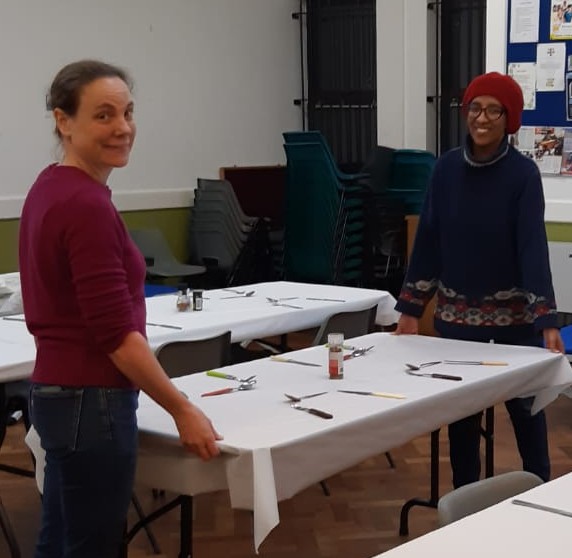According to the charity Shelter, 170,000 people are homeless in London today. Most of these individuals will live in hostels or be sofa surfing, but many have nowhere else to go but the streets. Figures collected by the Greater London Authority, using data from homelessness charities, suggest that the total number of people sleeping rough between October and December 2019 was 3,637. This is an 11% increase on the total figure for October to December 2018.
The problem is growing, but so is the response of the Catholic community, encouraged and supported by Caritas Westminster.
Many Catholic communities open their doors to rough sleepers by providing winter night shelters. Records held by Caritas Westminster indicate that one in seven of the churches across the Diocese of Westminster is involved with supporting a night shelter, usually as part of a local network of churches and faith communities.
A typical night shelter transforms a church hall into a hostel for 12 hours, opening at 8pm and offering a hot meal and a camp bed to a dozen or so homeless people. A breakfast such as porridge might then be served at 7am before the centre is closed down for the day, opening the following night at a nearby church of a different denomination, or at a synagogue or mosque.
Some shelters remain at the same venue and most open for just a few months in winter, whilst others are year-round. All shelters provide warmth, food, and safety. And all provide a non-judgemental welcome, a sense of community, and a respect for the dignity of all who are in need of help.
James Coeur-de-Lion helps to organise the Westminster Night Shelter Circuit, which rotates around 13 faith venues, including Westminster Cathedral. He says, ‘The fundamental part of being present in the night shelter is to have an encounter with the guests. This encounter begins with recognising that in every human being there we see our brother, our sister. When each of the volunteers encounters the guests in this way, they are able to communicate at a far deeper and more meaningful level where heart speaks to heart.’
Winter night shelters are an important part of the overall solution. They free up beds in shelters run by homelessness charities for those with more complex needs. Guests benefit from the loving care, conversation and friendships offered by the community volunteers. Those who stay at the shelter report feeling emotionally stronger, more confident and more resilient, ready to work with agencies on their move off the streets.
Moving people off the streets is the ultimate aim of the night shelters. Each shelter, or circuit of shelters, has case workers who can support individuals. Grants may be available for those who are ready to move into accommodation and people are told about other agencies they can go to for help.
One of the biggest circuits in the capital, Glass Door, runs around 30 night shelters. Last winter (2019-2019), they welcomed 700 guests aged between 17 and 83. By the end of the season, more than 200 of these had moved into housing and 59 had found employment. Glass Door, like many other winter shelter providers, runs drop in centres throughout the year for on-going support.
Our Lady Help of Christians in Kentish Town, runs a project called SanKTus which offers a Sunday afternoon drop in centre including bathing facilities and clothes. This group also organised an enormous Christmas dinner for over 100 guests. Anyone lonely, isolated or homeless was welcome and the response of the parishioners in giving their time or their money is amazing.
Caritas Westminster works with parishes to help them enhance their social outreach. If you would like to volunteer, as an individual or as part of a parish, school or community group, please contact caritasvol@rcdow.org.uk.
Working in a night shelter: one volunteer’s story
Night shelters could not happen without the hundreds of committed volunteers who help out night after night. It might be hard work but the rewards are numerous.
One volunteer, who has helped at a shelter in Chiswick, told us that she valued the time chatting with the guests, and getting to know them.
‘It makes a difference when you can greet someone by name when they walk in. It shows the guests they are recognised and valued as individuals, and not seen as just another homeless person.
‘The stories I heard from our guests were enlightening and eye-opening. I was shocked to find out that one of the men was actually working and still found himself homeless. Unfortunately, this is not a unique case, but is becoming more common.’
Before she volunteered, she said she had expected to end each night feeling depressed, but instead was uplifted.
‘I laughed a lot and went home with a sense of deep gratitude for the opportunity to spend time with our guests who manage to keep their spirits up in such difficult circumstances. I heard first-hand what I had known only in theory, such as how easy it is to slip into homelessness when your circumstances change, often beyond your control.
‘One of the guests had a learning disability. He brought a lot of laughter into the room and taught me how to play “UNO”, his favourite card game.
‘The best thing was when you learn that a guest would no longer be coming because they were off the streets. Every year, there are a number of guests who are helped through the night shelter projects to find a way back to a better place.
‘Three of the guests I met have found a place to live and are officially off the streets. Another former guest is back with his parents, but efforts are being made to see if he might qualify for some sort of assisted care. And yet another former guest now has an immigration solicitor and they are working to get his visa reinstated. He has started a window washing business which is doing well so far.’




